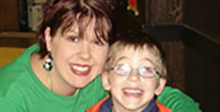Internal mini form
Contact Us Today
All parents hope their child will have friends. For children with disabilities, making memorable friendships can be a barrier. Here’s how to help a child break through what can be a heartbreaking and formidable roadblock.
The bonds of friendship
Friends are the people we turn to in times of joy and sadness.
Friends are the people who we feel comfortable discussing any problem with, or seeking advice from because they are fellow travelers on common paths. Friends, even more so than family members, can be our most trusted confidants; they enrich our lives and make our journey through life enjoyable.
Deep friendships – the kind of cultivated relationships that are easiest to develop in childhood – often seem elusive to children with disabilities for a variety of reasons. The most obvious roadblock is that having a disability can inadvertently affect the way a child may communicate with his or her friends.
Certainly, not all children that have a disability have trouble making friends; many are able to bond with other children their age easily. The converse also holds true – not all able-bodied children can tap into the social skills and confidence they need to form lasting bonds with others.
But when a child does exhibit a lack of self-esteem and is left on the sidelines at school or at play, it can be difficult for a parent to watch. Sometimes, parents of children with disabilities wonder how – or if – their child will make friends. On the upside, parents also know how much their child has to offer as a peer, and a friend.
On a deeper level, parents may wonder if their child has the opportunity to form positive bonds. When a child’s day is spent with therapists, helpers and care workers, it can be difficult for a parent to conceive how a child may develop the ability to relate to, and befriend, another child.
But children are resilient. And as soon as they go to school, or start observing other children at the park, they’re going to want to make friends. It’s a goal parents can affect, to a great level, if they understand where their child is developmentally, what qualities to encourage, and how a child will progress socially over time.
A child with disabilities can enjoy wonderful friendships. Some friends might have disabilities, and others may not. Children with disabilities can walk hand-in-hand, even if one child is on wheels.
With a little work, a child that wants to experience the same things as his or her peers can achieve that goal with opportunity, the right mindset and supports.
Special friends, significant bonds
Childhood should be a time when boys and girls are talking to their best friends about the latest sports star, or the hottest teen idols. Unfortunately, what comes with such ease to some children is an obstacle for others; it’s almost as painful to parents as it is for children when a young person isn’t connecting with their peers in a positive way.
For the child, that scenario can be a massive blow to their self-concept. Parents may say things like, “You didn’t want to hang out with those kids, anyway.” That sentiment isn’t going to make a difference to a child because it’s happening to them, not their parent.
For decades, psychoanalysts and human development experts have put forth several theories and strategies regarding how to help children develop socially. Nearly all theories of child development break out chronological growth through stages.
Typically, stages will build on the other; with the goal of self-actualization, which is another way of saying a person is fully-formed, able to empathize with others, is endowed with a healthy self-concept, and psychologically sound.
A parent’s role in affecting a child’s progression through various stages of development cannot be overstated; even a parent may not realize what a difference understanding each stage and how a child fits into it can make for their child.
Understanding each stage helps parents incorporate activities that are designed to pull a child out of his or her shell. Additionally, the more a parent knows about their child’s developmental stage, the more effectively he or she can implement a course-correction should a child veer off the established path.
One of the most cogent theories of social development is Erik Erikson’s “Eight Stages of Psychosocial Development”. The stages outline positive benchmarks – and their opposites – that span from birth to death.
Each step is based on making healthy choices for a child and teaching him or her to act in kind when opportunities to make decisions on their own present themselves. For instance, if a child is in Stage III, or “Purpose,” he or she is likely seeking to interact in a meaningful way with his or her surroundings. This stage takes place when a child is about 3 to 5 years old. An indicator that a child has not sufficiently mastered this stage is if they have co-dependent tendencies.
The following would be an example of a parent keeping a child on track. Let’s say a parent observes that a child is experiencing difficulties in forming bonds with other children or adults, they can encourage him or her to reach out. A parent could suggest something such as saying “hi” to one child they do not know per day, or answering one question per day in class. This will help the child develop conversational skills that can help him or her master the stage, and move forward.
Because of the number of mainstreamed classrooms in school today, children should not be limited to making friends only with other kids with disabilities. If a child feels like he or she has something in common with an able-bodied student, he or she should not feel anxious about seeking their friendship. If both children sense they have something in common, the fact that one has a disability may be a non-issue.
Nothing is more hurtful to a parent than watching a child suffer, physically or emotionally. What may surprise parents is how much they can affect a child’s social opportunities simply by making sure a child has a solid foundation.
This is not easy task in the face of what parents of children with disabilities experience. However, helping a child bond to others in a meaningful way sets the stage for many things that will be good in his or her life – good friends, plenty of activities, the ability to connect on a deep emotional level, and the ability to demonstrate empathy for others.
The sooner a parent starts making keen observations, the better. Once a child is able to master stages individually, the better prepared he or she will be to progress through additional growth stages.
Erikson’s steps do not specifically address children with physical or developmental challenges. But, his theory can be applied to those with a disability. A child with disabilities may not conquer stages in the same way as other children; he or she will likely move at their own pace and exert their needs in ways that are different from other children. This is completely okay; what matters is that a child is showing sustained progress. The goal is to form a well-adjusted, sociable child into adulthood, and parents can play a pivotal role in making that dream into a reality.

Acceptance
When a child with a disability reaches adulthood, feelings about acceptance by others may linger. If young people learn to accept themselves during their formative years, explore interests, form friendships, accomplish, interact, and socialize at age-appropriate stages, it can help empower a sense of belonging when they’ve grown.
Learn more
- About Acceptance
- Acceptance: Tips for Individuals with Cerebral Palsy
- Acceptance: Tips for Parents
- Acceptance: Tips for Teachers
- Inclusion
For more helpful tips, visit
Managing Cerebral Palsy and
Maximizing Potential.










